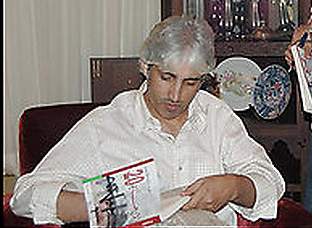Ten Percent Is Critical Mass

A Division Of Halliburton




Al-Bishi remembers the first execution he ever saw:
"I was at school, and an execution was set for my father in Mecca. It was to take place in front of the King Abd Al-'Aziz Gate. Before all that happened at the Al-Haram Mosque, the executions were held there. We showed up. I was a little boy. The first thing that came to my mind when people talked about executions was the digestive system. I wanted to see it. At that time, we had an exam at school on the digestive system, and we had to explain about the digestive system and whatever... So I came along, and the moment my father executed the man, I ran to see the digestive system, but all I could see was the man's head flying, and where the neck used to be, there was a kind of well. It went down. That's it. I couldn't take it anymore. I woke up in the car on the way home. At night, I tried to go to sleep, but couldn't. I had nightmares, but only once. Then I got used to it, Allah be praised."
Al-Bishi doesn't do just beheadings.
First TV host: "Do you cut off hands, or do you just do beheadings?"
Abdallah Al-Bishi: "Yes, yes. I carry out the punishment of cutting off thieves' hands, as well as the cutting off of a hand and a leg on alternate sides, as is written in the Koran."
Al-Bishi remembers being nervous his first day at work, though presumably not as nervous as his first customer:
"Every person is a bit worried when he starts a new job, and is afraid he will fail."
When asked if he has executed anyone he knew:
"Yes, I have beheaded many people who were my friends, but whoever commits an offense brings it on himself."
While men are beheaded by sword, women are dispatched with a pistol shot. Al-Bishi, in another interview, explains:
"I use a sword to kill male criminals... and firearms, specifically pistols, to kill female criminals. I think firearms are used to spare the woman, as to be executed by sword would mean uncovering her head and exposing her neck and some of her back."
"She only asked me to think carefully before committing myself. But I don’t think she’s afraid of me. ... I deal with my family with kindness and love. They aren’t afraid when I come back from an execution. Sometimes they help me clean my sword.”
 Saudis execute at least a couple people each week for such expected offenses as murder, rape, and drug dealing but also for robbery, fatal car accidents, adultery, apostasy (leaving Islam for another religion), and witchcraft. They are typically condemned to death after secret summary hearings without appeal. Very often, they are tortured into making false confessions. The condemned usually do not know of their death sentence until they are brought from their cell in handcuffs on a Friday, when executions are done. They are taken to a public square, nicknamed "chop-chop" square, forced to kneel, and beheaded.
Saudis execute at least a couple people each week for such expected offenses as murder, rape, and drug dealing but also for robbery, fatal car accidents, adultery, apostasy (leaving Islam for another religion), and witchcraft. They are typically condemned to death after secret summary hearings without appeal. Very often, they are tortured into making false confessions. The condemned usually do not know of their death sentence until they are brought from their cell in handcuffs on a Friday, when executions are done. They are taken to a public square, nicknamed "chop-chop" square, forced to kneel, and beheaded."They did not give me a chance to defend myself... The investigation was carried out with me by one person only but they all... ratified what he had to say even though they had not heard what I said to him... He threatened me with beating. They tied me up like an animal... I had no option but to accept and sign in order to protect myself. I signed in the hope that I would find someone in the police who would want to listen to the truth, but I was surprised with a more severe treatment... The officer put his shoe in my mouth, beat me up, put me in a cell, and did not allow any visits. He threatened me with worse treatment if I refused to agree to the confession in court. Under these circumstances I ratified my confession in the hope that someone would listen to me in court."

 Bernard Lewis, Professor Emeritus of Near Eastern Studies at Princeton University, a world authority on the history of Islam, shared his views on current events in the Middle East in an interview with the Jerusalem Post:
Bernard Lewis, Professor Emeritus of Near Eastern Studies at Princeton University, a world authority on the history of Islam, shared his views on current events in the Middle East in an interview with the Jerusalem Post: